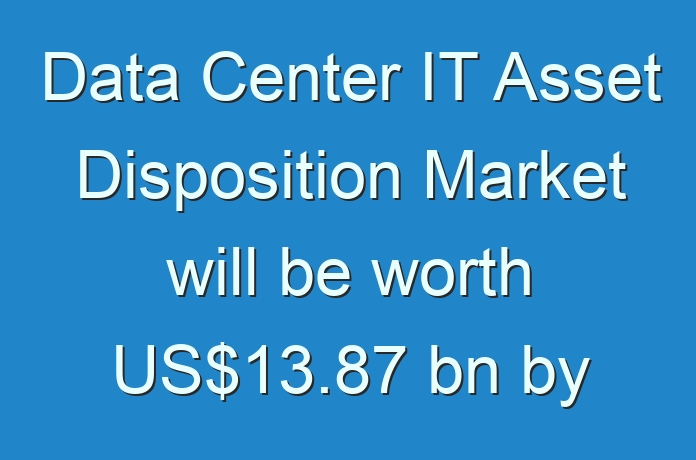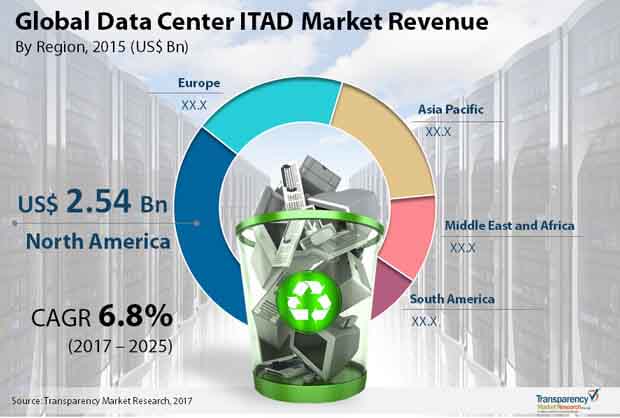
A recent market intelligence study by Transparency Market Research (TMR) detects that the global data center IT asset disposition market is in development phase with a highly prosperous future, owing to the ubiquity of electronic devices that need proper disposing in order to preserve the environment. There are plenty of opportunities for the existing players, with most of them implementing aggressive remarketing strategies to add to their enterprise level customers as well as focusing on incrementing their output in terms of remarketed products sold.
For instance, CCS providers such as Facebook Inc., Amazon Web Services Inc., Google Inc., Microsoft Corporation, and Apple Inc. have employed ITAD programs and procedures to dispose discarded assets in order to efficiently manage their unusable IT assets. This strategy enables them to comply with the regulatory policies pertaining to the environment and increase their returns.
As per the projections of the TMR report, the demand in the global data center IT asset disposition market will increase at an impressive CAGR of 6.8% during the forecast period of 2017 to 2025, estimating it to reach a valuation of US$13.87 bn by the end of 2025, substantially up from its evaluated worth of US$7.74 bn in 2016. Some of the key companies currently operating in the global data center IT asset disposition market are: Dell Inc., Hewlett Packard Enterprise Company (HPE), Arrow Electronics, Inc., Apto Solutions, Inc., CloudBlue Technologies, Inc (Ingram Micro, Inc.), LifeSpan International, Inc., Iron Mountain Incorporated., ITRenew Inc., TES-AMM Pte Ltd., and Sims Recycling Ltd.

For More Details, Request A Sample Report@ https://www.transparencymarketresearch.com/sample/sample.php?flag=S&rep_id=29720
Servers Emerge as Highly Profitable Asset-type Segment
Based on asset type, the report segments the global data center IT asset disposition market into memory modules, servers, CPU, HDD, GBIC, desktops, line cards, laptops, and SSD, and rates serve as the most in-demand segment, gaining traction from the proliferation of cloud computing, growing number of data centers, and growing big data applications. On the basis of service, the market has been bifurcated into data sanitation or destruction, remarketing or resale, and recycling, with data sanitation of destruction providing maximum demand, as a result of compliance with the National Institute of Standards and Technology (NIST) and Department of Defense (DoD) guidelines.
Geographically, the report takes stock of the potential of data center IT asset disposition market in the regions of North America, Europe, Asia Pacific, the Middle East and Africa (MEA), and South America, with North America currently being the most lucrative region, serving 34% of the demand in 2015. On the other hand, Asia Pacific is anticipated to increment the demand at most prominent growth rate among all the regions, driven by high adoption rate of cloud services by numerous enterprises in the a number of emerging economies such as Japan, Singapore, China, India, and South Korea.
Regulatory for Eco-friendly Practices Driving Demand
Regulatory compliances in several countries to preserve the environment, growing need of information, escalating data security concerns from old assets, and increasing adoption of new technology and Byod are some of the key factors driving the demand in the global data center IT asset disposition market. On the other hand, lack of awareness, high service cost, and limitation of comprehensive IT asset disposition policies are a few challenges obstructing the global data center IT asset disposition market from attaining its true potential. Nevertheless, the vendors of this market are expected to gain new opportunities from value recover from obsolete assets as well as strategic partnerships and acquisitions of promising new entrants.
Get More PR by TMR: https://www.biospace.com/article/ai-in-medical-imaging-covid-19-game-changer-in-healthcare-sector/





